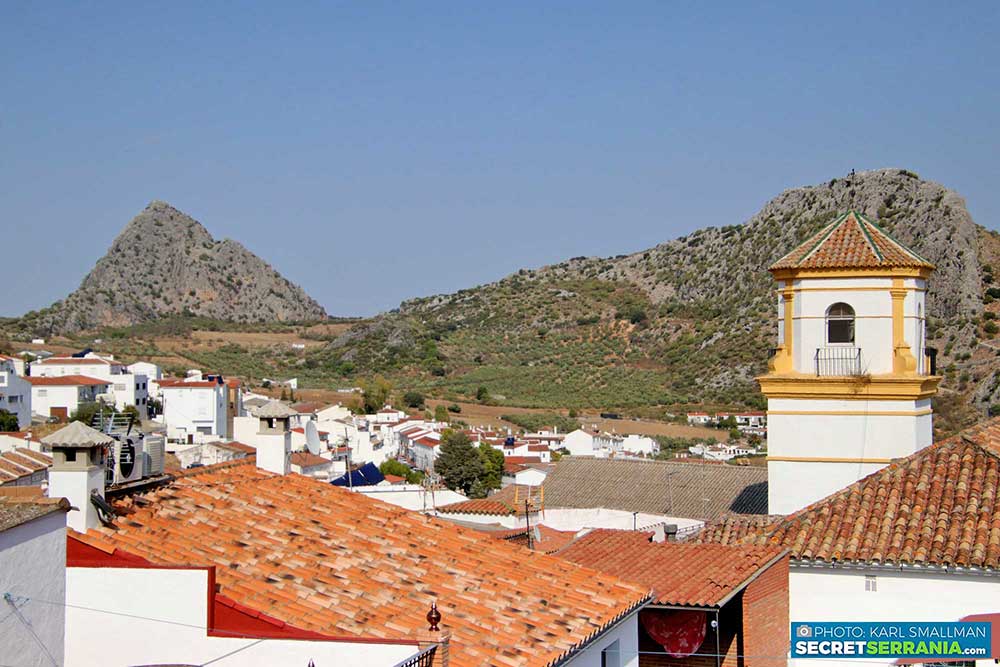DIGITAL NOMADS
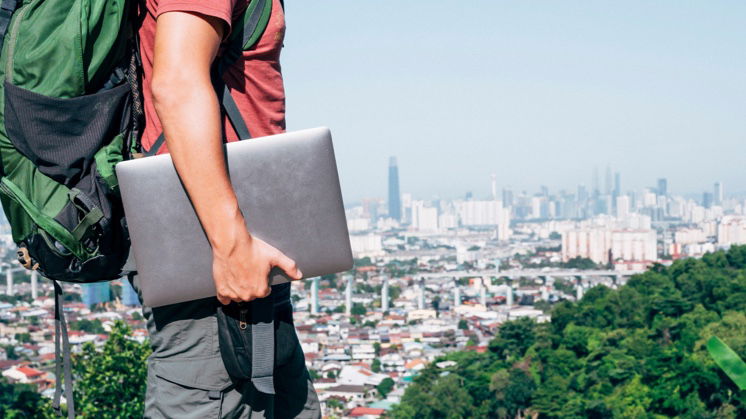
This new section of the "Help Me, Ronda" website is designed to embrace this new trend, offer an advertising space for property owners who wish to give it a try and for potential nomads to find somewhere to live and work for a period of time.
Please scroll down for properties set up for remote working.
***
DIGITAL NOMADS – a future income source for renters?
Monday, October 16, 2023
By Pablo de Ronda
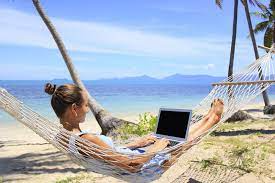
If you have a property for rent in Spain, eg una vivienda rural, or una casa rural, you probably struggle to get bookings in the autumn and winter months.
Could digital nomads be the solution to this problem?
Covid-19 aftermath
Since the Covid-19 pandemic hit the world at the end of 2019 / beginning of 2020, working practices have changed. During the several lockdowns throughout the world, in many countries employees were instructed to work from home.
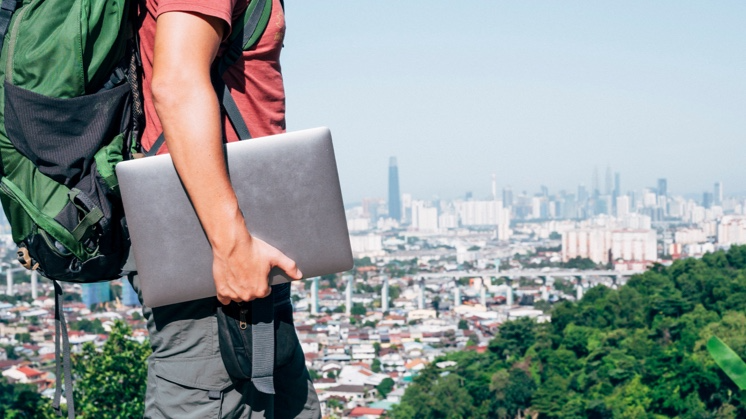
As a result, most employees and some employers realised that you didn’t need to put on a suit and tie and travel for an hour to an office in order to work effectively. It was perfectly feasible to work productively from home, more so, in fact.
As a result of this change of working practice, several things have happened:
Workers have realised that it suits them to work from home. They don’t waste time and money commuting to an office. They aren’t distracted by co-workers who constantly offer coffee, who want to natter, and phones aren’t ringing constantly, like they do in the office.
Enlightened employers have realised that productivity has increased amongst their home workers and that they don’t need to rent expensive office space to accommodate their workers. In major cities, such as Berlin, London, Madrid, New York and Paris many are giving up their expensive city centre office spaces.
Workers have cottoned on to the fact that they can work remotely from anywhere. So, with laptop in hand they head off to work in beautiful locations around the world. They put in the required hours, but can travel and get to know new people, and experience new languages and cultures.
***
Being a digital nomad must be a no-brainer, especially if you’re young with no family commitments.
Looking to the future
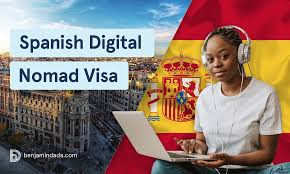
Some countries are ahead of the game and already have a healthy cohort of digital nomads. Others, like Spain, are playing catch-up. The Spanish government has realised the potential of this movement and has introduced a special visa for digital nomads, making it easier for them to come to Spain and work for up to three months. No need to have money in the bank, nor a regular deposit into the bank and no tax payable in Spain.
***
Sounds good to me. I wish I was younger …. But, hey, I’ve had my time and I am now living contentedly where I want to live, in Spain.
© Pablo de Ronda
Other information:
DIGITAL NOMADS – What is this new trend? (eyeonspain.com)
Tags:
Covid-19, digital nomad, Pablo de Ronda, special visa, working from home
***
DIGITAL NOMADS – What is this new trend?
Monday, October 2, 2023
By Pablo de Ronda
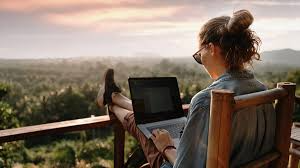
Digital nomads are remote workers who work from different locations, often a foreign country. They often work in cafes or bars, co-working spaces, or public libraries, relying on devices with wireless internet capabilities, like smart phones and mobile hotspots to allow them to do their work wherever they want.
With 34% of remote employees working 4-5 days a week out of the office, the digital nomad lifestyle could be an exciting possibility if you’ve caught the travel bug and want to break free from the shackles of 9-5 life.
Who are digital nomads?

Digital nomads are people who travel freely while working remotely, using technology and the internet. Such people generally have minimal material possessions and work remotely in temporary housing, hotels, cafes, public libraries, co-working spaces, or recreational vehicles, using WiFi, smartphones or mobile hotspots to access the Internet.
The majority of digital nomads describe themselves as programmers, content creators, designers, or developers. Some digital nomads are perpetual travellers, while others only maintain the lifestyle for a short period of time.
While some nomads travel through multiple countries, others remain in one area, and some may choose to travel while living in a vehicle, in a practice often known as van-dwelling.
In 2020, a research study found that 10.9 million American workers described themselves as digital nomads, an increase of 49% from 2019.
Benefits of being a digital nomad
People typically become digital nomads owing to a desire to travel, to enjoy location independence and the lowered cost of living often provided by leaving expensive cities.
Cost of living ranks chief among the criteria that digital nomads value when selecting a destination, followed by climate, diversity, and available leisure activities.
There are also benefits for employers, as a 2021 study concluded that there is a causal relationship between worker productivity and the option to "work from anywhere," as workers who were freed from geographic limitations showed an average output increase of 4.4% while controlling for other factors.
Digital nomads also typically spend more than 35% of their income in the place where they are staying, an injection of capital that has been shown to stimulate local economies in popular destinations, primarily promoting the service industry and the sale of consumer goods.
According to the online blog Hobspot, there are five benefits which stem from being a digital nomad:
1. You’ll be more productive.
2. You’ll have more breakthrough ideas.
3. You’ll become more adaptable.
4. You’ll have more time to do the things you love.
5. You’ll make lifelong friendships.
Challenges of being a digital nomad
Although digital nomads enjoy advantages in freedom and flexibility, they report loneliness as their biggest struggle, followed by burnout.

Feelings of loneliness are often an issue for digital nomads because nomadism usually requires freedom from personal attachments such as marriage. The importance of developing quality face-to-face relationships has been stressed to maintain mental health in remote workers.
Other challenges include: maintaining international health insurance with coverage globally; abiding by different local laws including payment of required taxes; obtaining work visas; and maintaining long-distance relationships with friends and family back home.
Digital nomads also very rarely have access to retirement benefits, unemployment insurance, or set time off from work, and often make less money than they could make through traditional employment.
As many digital nomads resort to gig work or freelancing, their opportunities for pay can be inconsistent and sporadic.
Other challenges may also include time zone differences, the difficulty of finding a reliable connection to the internet, and the absence of delineation between work and leisure time.
There are a few contributing factors to the blurring of this line; certain paid work can be viewed as leisure when it is enjoyable, but many tasks that involve travel and acquiring accommodations can become viewed as another type of work, even though those would traditionally fall into the leisure category.
Another issue faced by digital nomads is that of mobility; a travelling worker must be able to keep any necessary equipment with them as they move from location to location, and it is difficult too for a digital nomad to manage personal belongings. In fact, many digital nomads do not have a "home base," and must therefore adopt a minimalist lifestyle.
One potentially negative impact of digital nomadism, that does not affect the nomads themselves, is the possibility of 'transnational gentrification.' Concerns have been raised about the nature of the relationship between digital nomads, who are most often from the Global North, and the countries they travel to, generally in the Global South.
The problem may arise in regards to competition for housing between native people and travelling workers, as well as in personal interactions and the risk of tourism over-dependency.
The impact of Covid-19

In 2020, a research study found that 10.9 million American workers described themselves as digital nomads, an increase of 49% from 2019. The primary reason for this rapid increase is office closure and the shift toward home-working brought about by the COVID-19 Pandemic.
Multiple countries were prompted to offer new visa programs and to change their policies towards foreign workers because of the pandemic.
The pandemic had a larger impact, in terms of mobility, on traditional job holders than on independent workers. While the number of independent workers living as digital nomads increased slightly in 2020, the number of traditional workers who changed their lifestyle to live as digital nomads nearly doubled, from 3.2 million people in 2019 to 6.3 million in 2020.
This is because many traditional jobs stopped requiring their employees to physically report to an office or set location every day, so many people were subsequently able to travel freely while still working.
An important effect of the pandemic was the limited ability to travel, particularly across national borders. For this reason, more and more digital nomads have chosen to remain domestic, especially in the United States. Living as a digital nomad often entails travelling from high-cost areas (eg major cities) to cheaper regions (foreign or domestic).
Though the rapid increase of digital nomads in 2020 is expected to be more than just a short-lived trend, the extreme rate of change is not likely to continue indefinitely.
The pandemic locked us down, but at the same time freed many workers from the confines of the office. A new breed of digital nomads emerged – people who took their laptops, jumped on planes and set up shop in some of the most beautiful parts of the world. And with them have come schemes to make it easier for them to stay for months on end.
Barbados was one of the first countries to formalise arrangements with its “welcome stamp”, launched in June 2020. To qualify, workers must earn more than US$50,000 (£37,000) during the 12 months they are in the country and pay $2,000 for the application. They will not be subject to income tax while they are there.
In June 2021, Malta launched a nomad residence permit with which workers can live in the country once they earn €2,700 (£2,230) a month. Applicants pay €300 each, plus the same for each dependant.
Iceland has operated a long-term visa for remote workers since October 2020, and Bermuda has a new “work from Bermuda” certificate. Spain and Sri Lanka are set to follow suit.
The schemes all run in a fairly similar fashion: workers pay to apply and get the right to stay in the country while working for an employer based elsewhere. The visas typically last a year, which can usually be extended once the time is up. Once you have one in place, you can rent a property and travel in and out of the country.
Spain and digital nomads
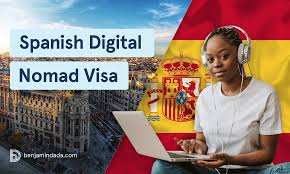
In 2021, Spain announced plans for a digital nomad visa. The law responsible for the digital nomad visa is known as the Startup Law. In December 2021, the law was presented to parliament, and in January 2022, a draft of the law was approved. The Startup Act was approved by parliament in November 2022. According to the law, Digital Nomad Visas in Spain are initially valid for up to 12 months and can be renewed, which will allow digital nomads to reside in Spain for up to five years, and they receive special tax benefits by paying a reduced tax rate.
© Pablo de Ronda
This is a shortened version of an article which first appeared online at DIGITAL NOMADS – What is this new trend? (eyeonspain.com) on 2 October 2023.
Sources:
The Guardian
Hobspot
SUR
Wikipedia
Photos:
Acer
The Entrepreneur
Global
The Guardian
Iberdrola
Wikipedia
Tags: Barbados, Bermuda, Collaborate: ideas & images, digital nomad, Guardian HM Revenue & Customs, Hobspot, Iceland, Keystone Law, Lauren Anders Brown, Lee McIntyre-Hamilton, Malta, remote working, Spain, Sri Lanka, Startup Act, SUR, Wikipedia
***
Calling all digital nomads
Why not spend the winter in the beautiful Serrania de Ronda?
You can do your work whenever it suits, and enjoy the mountains, the valleys, the caves, the scenery and the coasts, as well as stunning Ronda and the wide variety of pueblos blancos in the area.
Casa Real, Montejaque
Available from 1 April 2024 as a fully equipped space for digital nomads.
STOP PRESS! CASA REAL, MONTEJAQUE, has just had a makeover. It has got bigger and is now a DIGI-HOUSE.
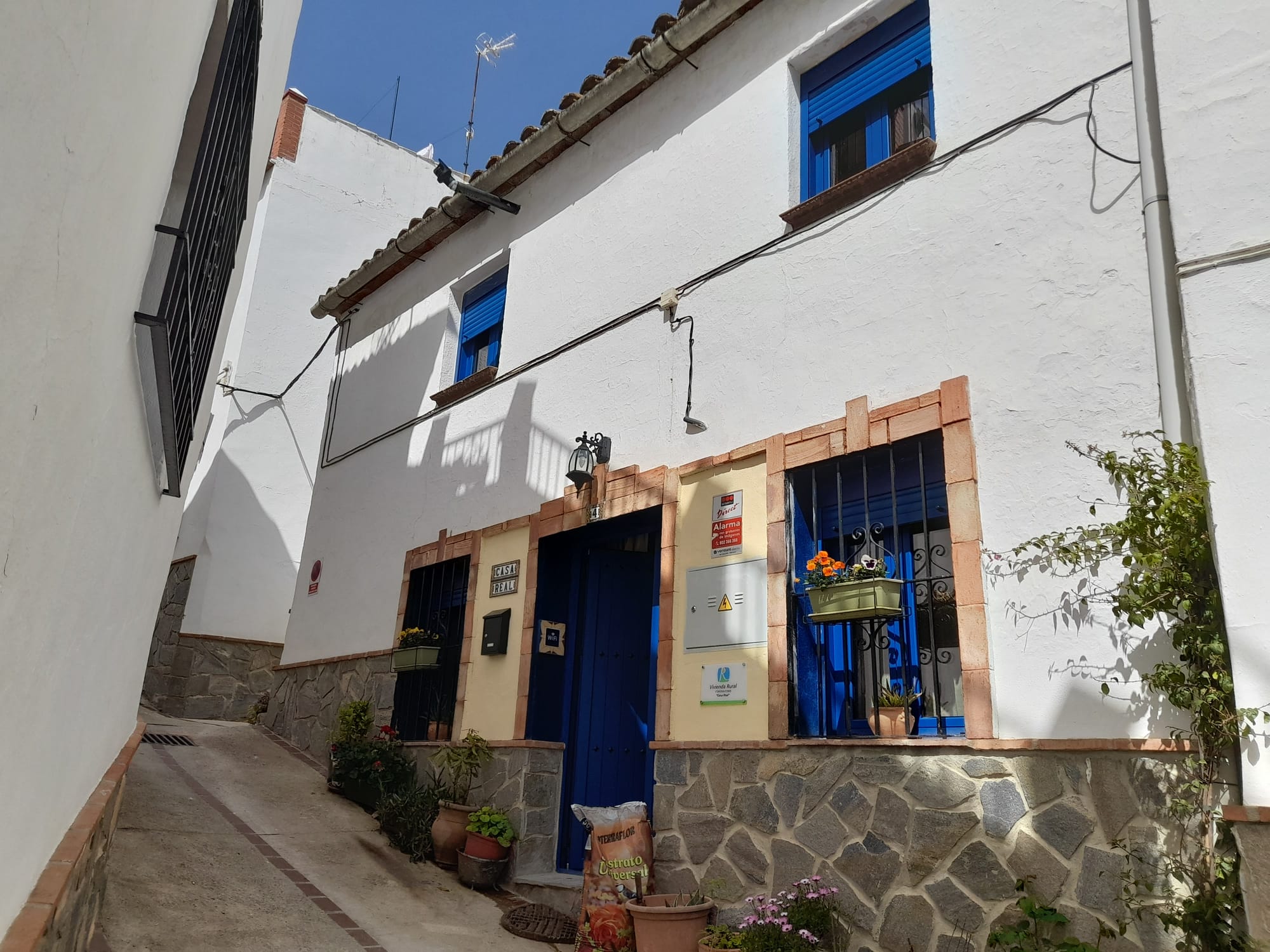
Casa Real, Montejaque in Montejaque (Málaga) now sleeps six plus an infant. It has also been reconfigured into a DIGI-HOUSE, fully equipped for DIGITAL NOMADS.
The owners have turned the large Burgundy Room into a family room with two single beds, space for a cot and a designated office area.
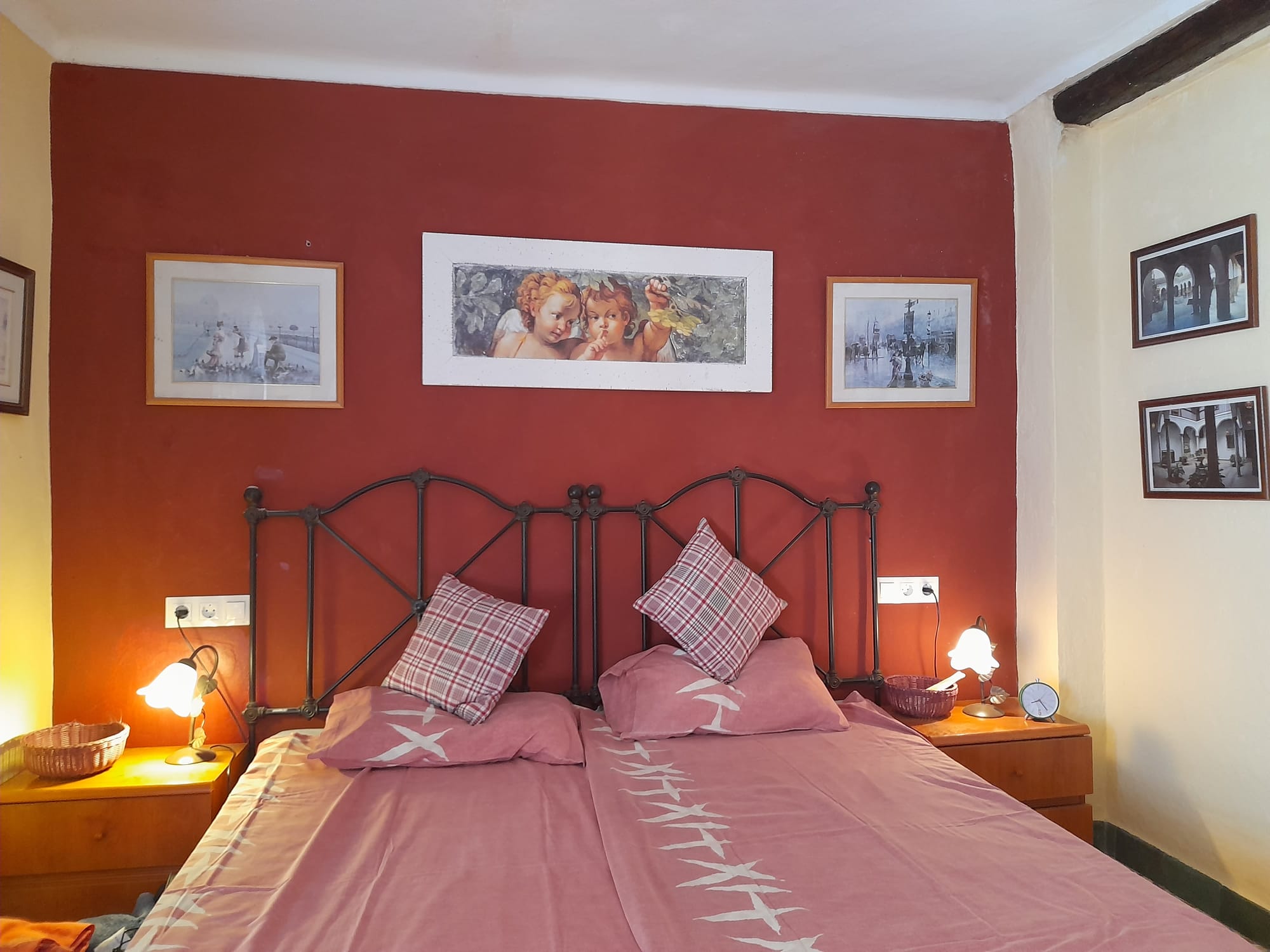
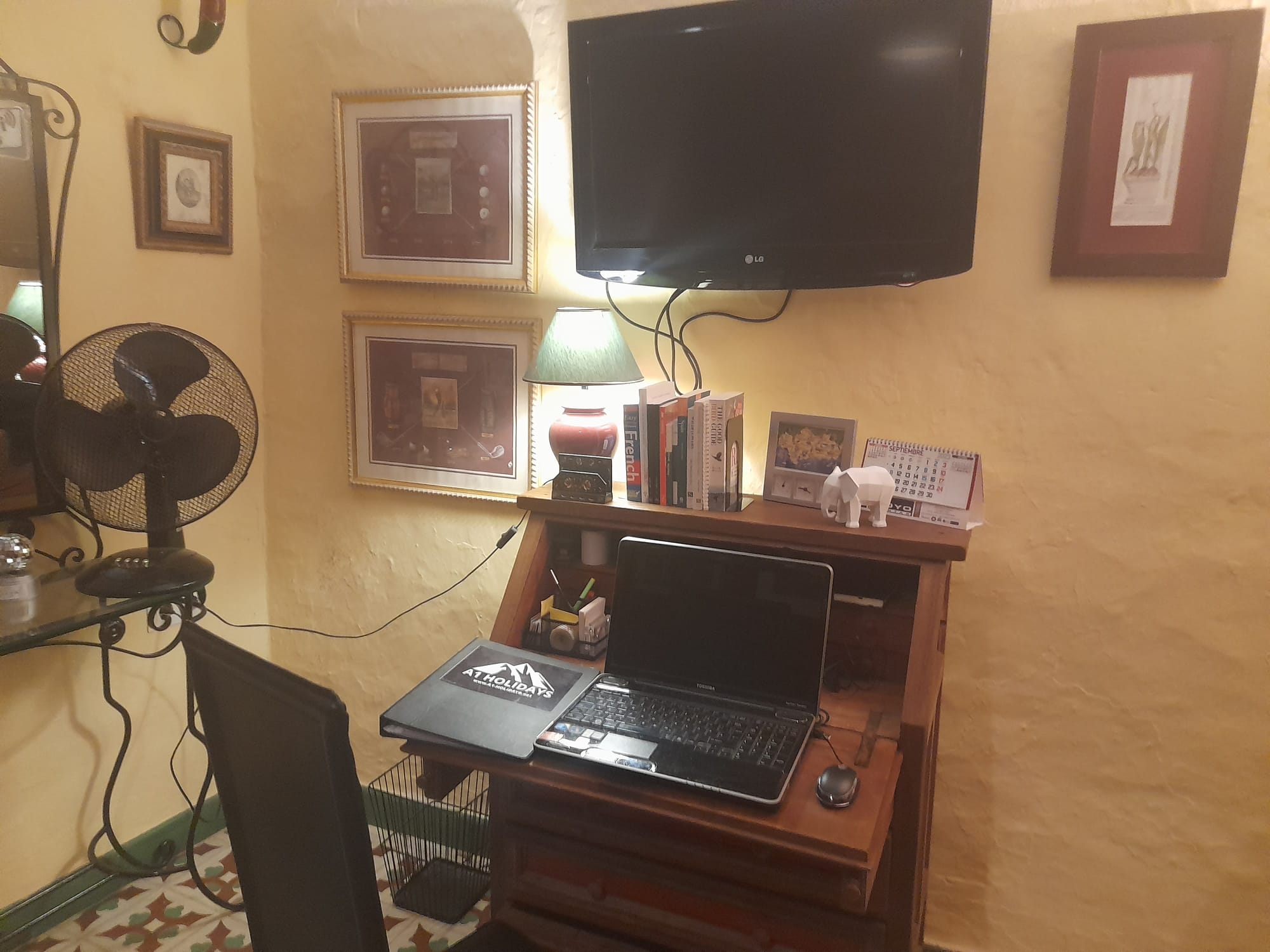
The newly completed Ochre Room is similar, with two single beds and an office area.
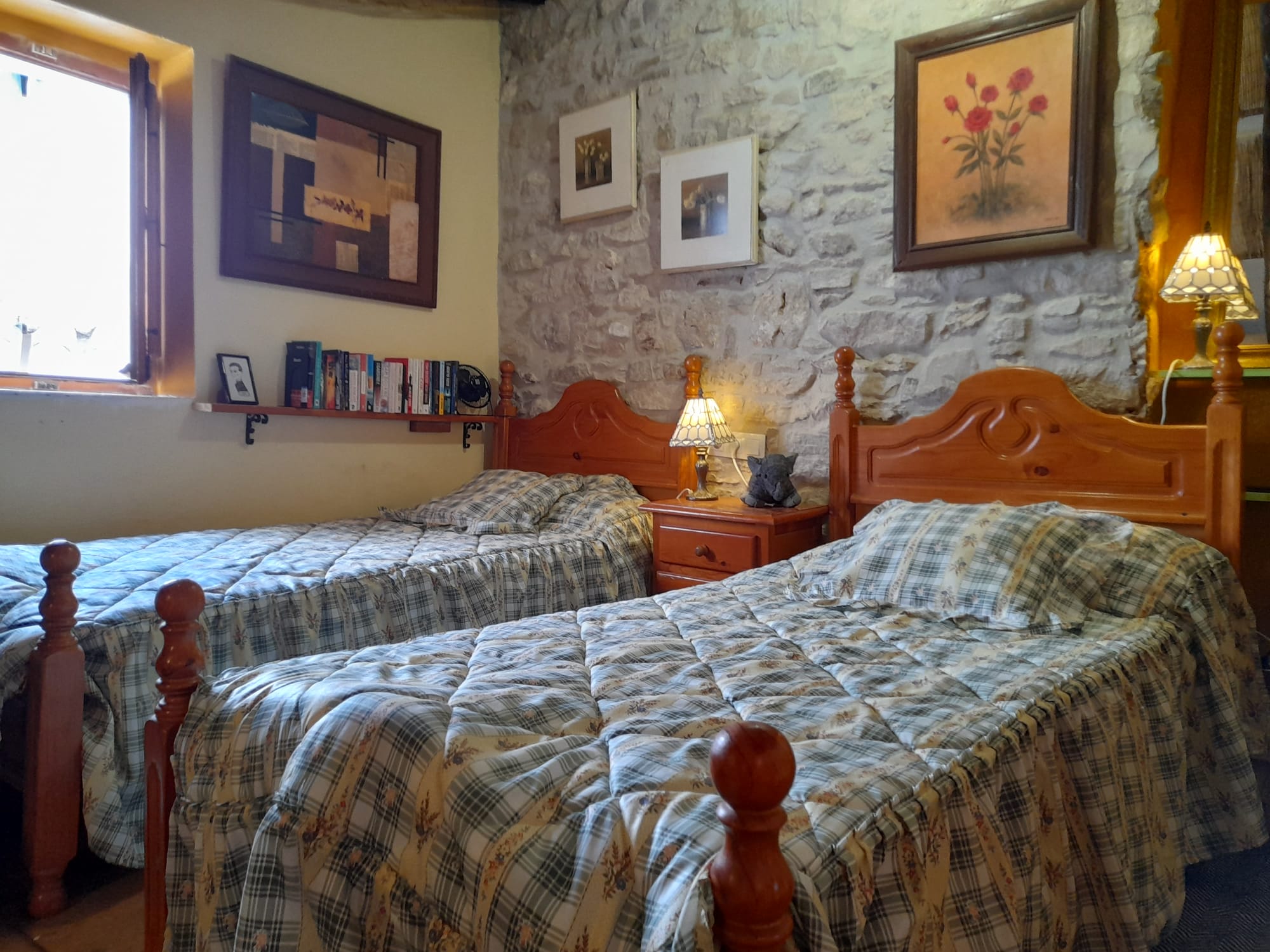
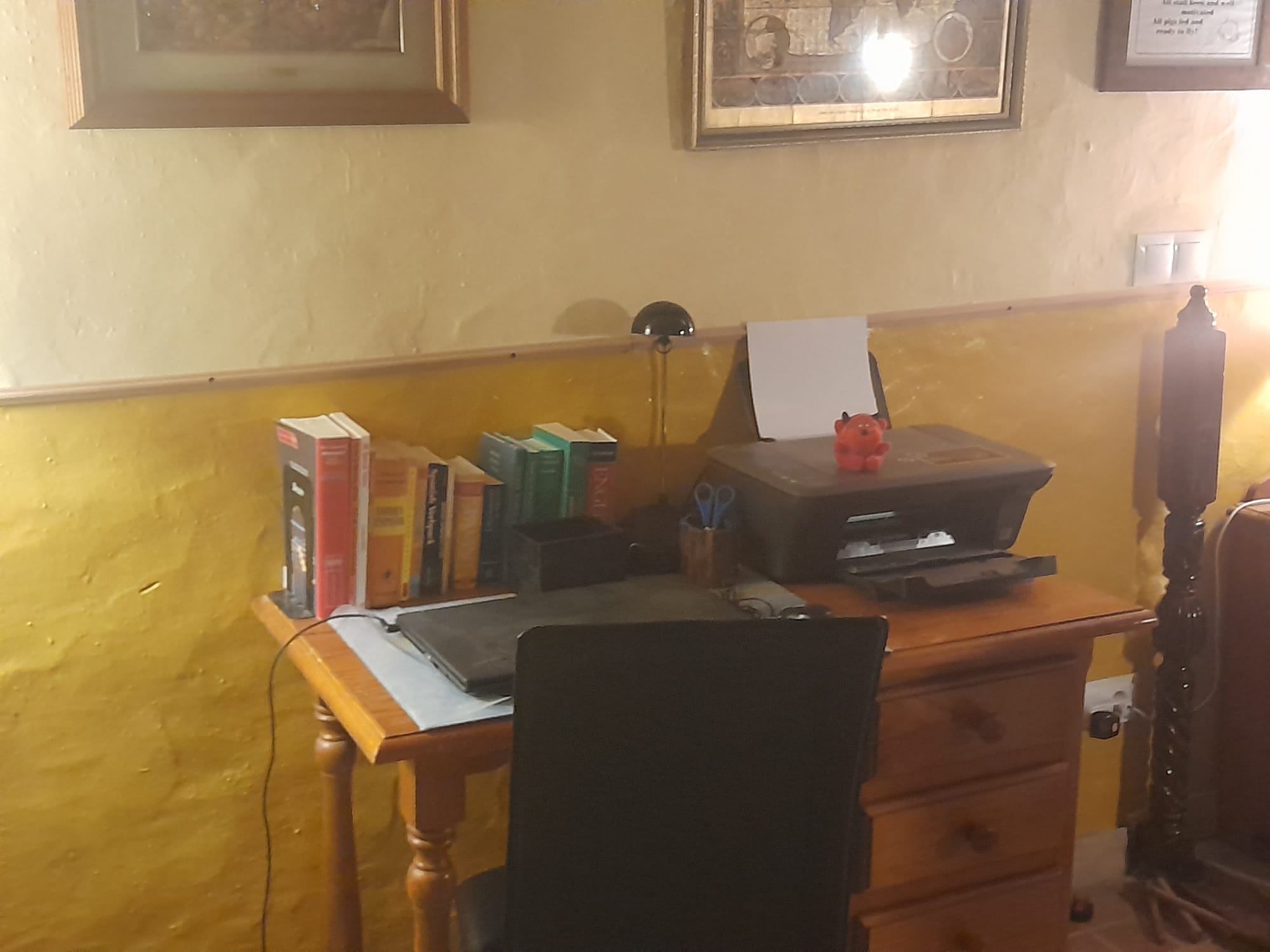
The Green Room offers a double bed, as before.

With its open-plan lounge, dining room and kitchen; two modern bathrooms; shady internal patio and roof terrace with views, this is the ideal spot for one (or two) digital nomads to spend the autumn, winter and spring in this beautiful pueblo blanco.

Each workspace with its own private bathroom is in a separate part of this large house. The living areas, ie lounge, dining room and kitchen are shared, as is the internal patio and the large roof terrace.
The house benefits from fast fibre-glass WiFi.
Literally, one minute from the square (if that) this tastefully restored 19th Century village house is well-priced.
Well located near the village square in Montejaque, Casa Real, Montejaque is traditional in style, with two modern bathrooms and kitchen.
It currently sleeps six adults, plus one child by agreement.
Montejaque is a pretty pueblo blanco in the Grazalema Natural Park, and just 20 minutes’ drive from Ronda.
We live nearby so are on hand to meet you on arrival, to orientate you and to be available throughout your stay for any queries or to solve any problems. Between us we speak English, Spanish, German and French.
Because we renovated it ourselves to be a second home, Casa Real, Montejaque is a cut above your average rental. The house offers comfortable living throughout. It is well furnished with lots of personal items belonging to us.
Officially registered with the authorities as a vivienda rural, Casa Real, Montejaque has to meet strict standards of comfort and safety and is regularly inspected.
Nº: VTAR/MA/03565
As a result of the pandemic, the house is also subject to a set of Covid-19 protocols, which are strictly adhered to. In addition, the house is thoroughly cleaned between lets by our faithful cleaners, Luisa and Mari-Ángeles.
We provide disinfectant gels as well as soap in both bathrooms and in the kitchen/living area.
You can stay and work in Casa Real, Montejaque confident that you are staying in one of the cleanest places in town.
There is free WiFi, a Bluetooth speaker, a CD player/radio and a DVD player and a television in the lounge and two of the bedrooms.
Casa Real, Montejaque has been imaginatively designed to retain many traditional features but with modern bathrooms and kitchen.
The house allows guests to get the best out of the surrounding area and the wonderful climate.
The large L-shaped lounge, dining room and kitchen retain many original features. This leads into the hallway which in turn leads to the patio, the downstairs bathroom, the laundry room, and the stairs to the first floor and The Ochre Room and office space number 1.
Up the main stairs is a large bedroom, named The Burgundy Room, with two single beds, a built-in wardrobe, a dressing table, office space number 2, and a wall-mounted flat-screen TV. There is room for a cot/child’s bed.
The third bedroom, The Green Room, has a standard double bed, 2 bedside tables, dressing table and a wardrobe. There is also a TV.
All beds have brand-new mattresses.
There is a second bathroom and stairs leading to the roof terrace.
The roof terrace affords a 360° view of this most beautiful of the pueblos blancos of the Serranía de Ronda, as well as the emblematic mountains Hacho and Tavizna and the surrounding valley and olive and citrus groves.
The roof terrace has recently been extended to three times its former size. There are six comfortable reclining chairs, a large table, a sunbed and two sun umbrellas and, also, a built-in barbecue.
The traditional patio downstairs is completely private and perfect for shady al fresco dining. There is a table, six chairs and a sun umbrella, as well as a lovely, scented jasmine.
As a self-catering house, you’ll find everything you need for a perfect working environment.
The kitchen is fully equipped with a large fridge/freezer, electric hob and oven, kettle, coffee maker and microwave oven. It is fully stocked with oil, vinegar, salt, pepper, herbs and spices, coffee, tea, infusions, sugar, etc.
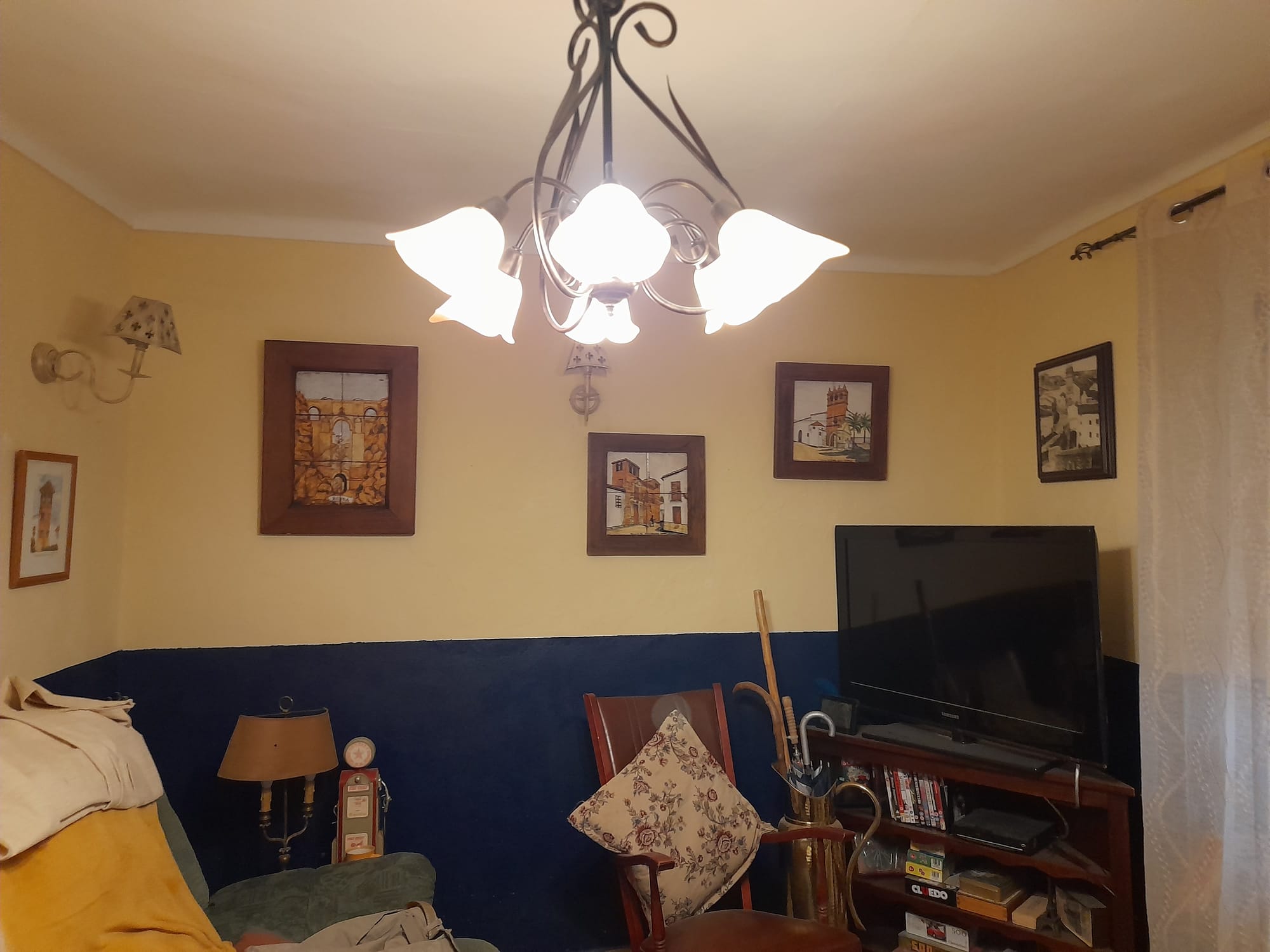
The two modern bathrooms are brand new. The upstairs bathroom has a WC, bidet, washbasin, vanity unit and a full bath with shower over.

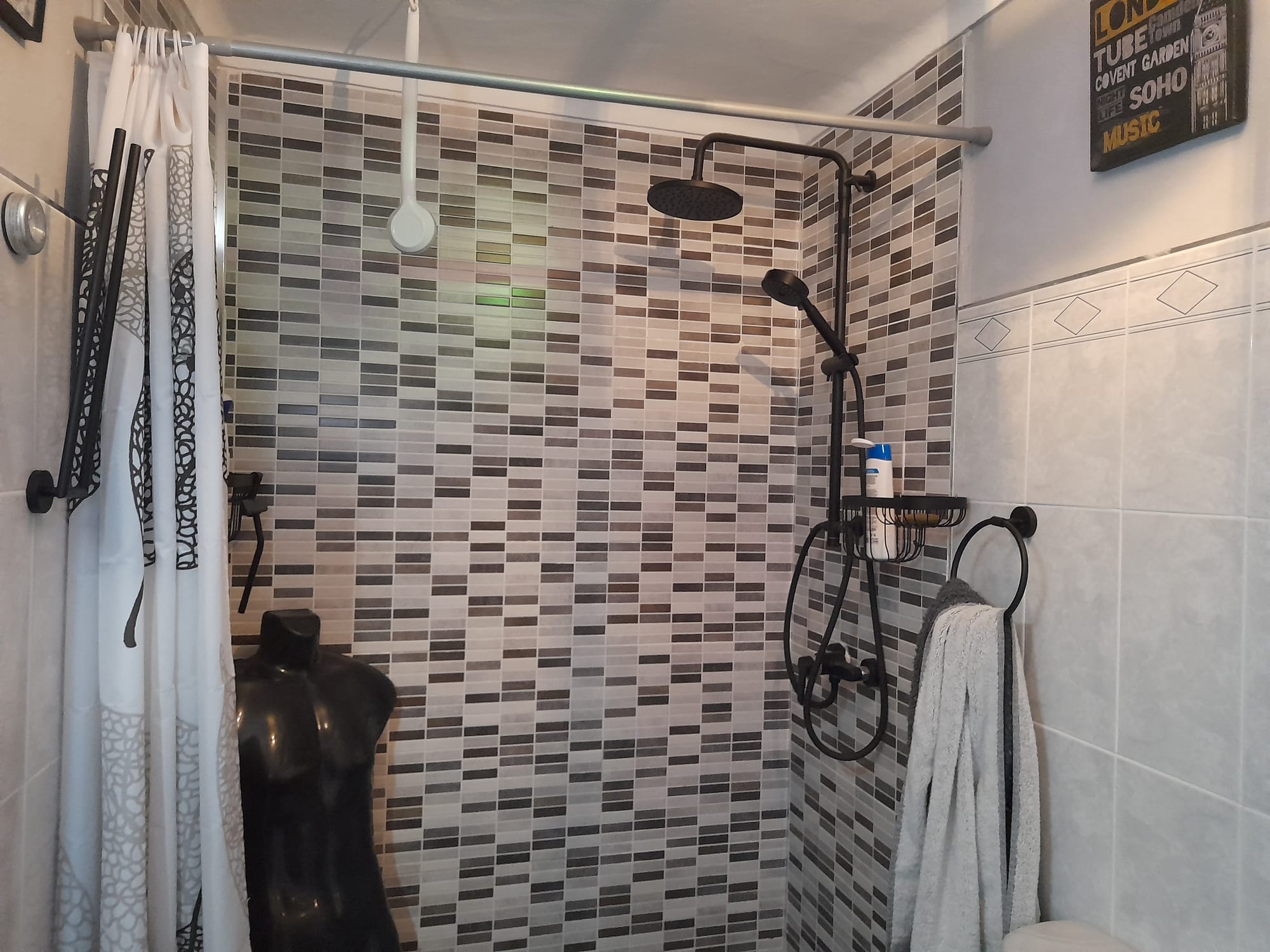
The downstairs bathroom is a wet room with WC, bidet, washbasin and a walk-in rainfall shower.
There is a separate laundry room with a brand-new washing machine and traditional Spanish pila or sink.
Linen and towels are all included to make your stay more complete.
House rules:
Check-in time is from 3 pm and check-out is 10 am.
Smoking is not allowed, except on the roof terrace.
Free on-street parking is available throughout the village, as well as two municipal car parks (also free).
Pets are not allowed at the property.
Strictly no parties allowed.
There is also a selection of board games, playing cards and jigsaw puzzles for you to enjoy.
Cleaning before and after your stay is included in the price. Extra cleaning and fresh bedding and towels can be provided for a nominal charge of €50.
Prices (fully inclusive – no extras*) | ||
1 month = 1,000€ all inclusive 2 months = 1,750€ all inclusive 3 months = 2,500€ all inclusive | ||
NOTE: These prices only apply from 1 November 2023 - 31 March 2024 | ||
Prices include electricity, water, gas, pellets and final clean.
*Extra cleaning and fresh bed linen and towels are available on request for an extra charge of €50 per time. Otherwise, you can take care of your own laundry.
Payment is by transfer to our Spanish bank account, or monthly in cash. Details will be provided when you make a booking.
***
Casa Rita, Montejaque

CASA RITA is a village house holiday rental in Montejaque with 2 bedrooms, 2 bathrooms, a hot tub/jacuzzi and mountain views. Sleeps 4 adults plus up to two children by arrangement.
From 1 November 2023 CASA RITA is available as a DIGI-HOUSE, for IT professionals who wish to be DIGITAL NOMADS by undertaking an extended period of remote working while experiencing life in another country.
Casa Rita is a charming, restored village house located in the original Moorish upper part of the pueblo blanco, Montejaque, just 20 minutes from Ronda in the Grazalema Natural Park.
Officially registered with the authorities as a vivienda rural, Casa Rita has to meet strict standards of comfort and safety and is regularly inspected.
There is free fibre-optic WIFI, a Bluetooth speaker and a television in the lounge.
There is a hot tub/Jacuzzi available in season.
Casa Rita has been imaginatively designed to get the best out of the surrounding area and the wonderful climate.

The large roof terrace affords a 360° view of this most beautiful of the pueblos blancos of the Serranía de Ronda, as well as the emblematic mountains Hacho and Tavizna and the surrounding valley and olive and citrus groves.
As a result of its position, Casa Rita is one of the few houses in the village that enjoys sunshine all day long, all year round. If the sun is too hot it has shady areas too.
The municipal swimming pool is 20 minutes walk away or five minutes by car (July to September only)..
Official registration number: VTAR/MA/00775
We used the long Covid-19 lockdown to carry out some major renovation work on Casa Rita in Montejaque.
All external doors and windows have been replaced with double-glazed units.
We have removed a downstairs wall to create a large ground-floor lounge. This means that the first-floor open-plan kitchen/dining area is much larger than before.
We have a newly laid terrace on the first floor.
A pellet burner has been installed in the lounge. There is an open log fire upstairs in the dining room.
We have installed an extractor fan in the kitchen.
We have upgraded much of the furniture, fixtures and fittings.
We have installed a hot tub/Jacuzzi on the roof terrace.
As a self-catering house, you’ll find everything you need for a perfect stay.
CASA RITA RE-OPENS FOR BUSINESS AS A DIGI-HOUSE ON 1 APRIL 2024
The kitchen is fully equipped with a large fridge/freezer, hob, oven, extractor unit, kettle, coffee maker and microwave. It is fully stocked with oil, vinegar, salt, pepper, herbs and spices, coffee, tea, infusions, sugar, etc.

Casa Rita has 2 bedrooms and can comfortably sleep 4. By arrangement, we could accommodate 2 children in addition to 4 adults. There is a cot and high chair.
In the first bedroom, you will find a king-size double bed and a digital nomad workspace.

The second bedroom has a standard double bed.

There is a separate office/store room with a further digital nomad workspace.
There is a WC adjacent. Access to full bathroom available.
There are 2 bathrooms and a third WC.
The first bathroom has a toilet and sink and a full bath with a shower over.

The second bathroom has a toilet and sink and a walk-in shower. The washing machine and tumble drier are located here.
Linen and towels are all included to make your stay more enjoyable.
House Rules:
– Check-in time is from 3 pm and check-out is 10 am.
– Smoking is not allowed.
– Free on-street parking is available at 7 minutes approximately.
– Pets are not allowed at the property.
– Strictly no parties allowed.
Cleaning before and after your stay is included in the price. Extra cleaning and fresh bedding and towels can be provided for a nominal charge of €50.
Prices (fully inclusive – no extras*) 1 month = 1,000€ all inclusive 2 months = 1,750€ all inclusive 3 months = 2,500€ all inclusive NOTE: These prices only apply from 1 November 2023 - 31 March 2024 | ||
Prices include electricity, water, gas, pellets and final clean.
*Extra cleaning and fresh bed linen and towels are available on request for an extra charge of €50 per time. Otherwise, you can take care of your own laundry.
Payment is by transfer to our Spanish bank account, or monthly in cash. Details will be provided when you make a booking.
About the owners:
Paul and Rita met in Ronda at the Feria de Pedro Romero (Ronda’s annual festival) in September 2008 and hit it off straight away. A few months later Paul emigrated from the UK and they lived together in Casa Rita in Montejaque for nearly three years. They married in 2010 and moved to Villa Indiana in 2011.
